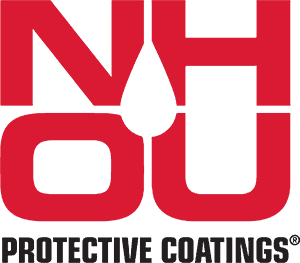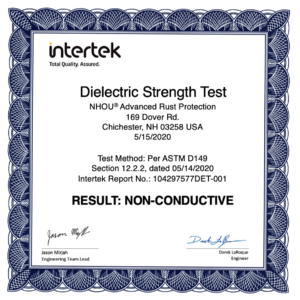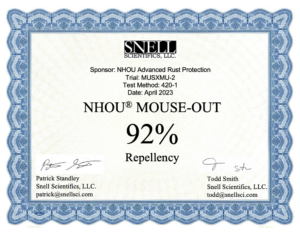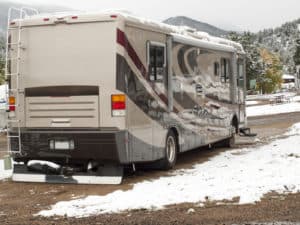NHOU® Rodent Defense Vehicle Protection
92% Effective Rating From Third-Party Testing
This product targets mice’s primal senses, specifically their olfactory system, eyes, nose, and mouth.
It is made with natural peppermint and cinnamon and a synthetic predator scent that is undetectable by humans. These essential oils are designed to repel mice and prevent them from invading your car, RV, or camper, chewing on wiring and fabrics, and building nests.
When used as directed, this product is environmentally friendly and does not contain harsh chemicals, glue traps, or rat poison. It can be safely sprayed in your home without worry, and unlike traditional mouse traps, there are no trapped or poisoned rodents to get rid of.
This spray can be used both indoors and outdoors, in areas such as cars, RVs, boat or car storage, machinery, attics, basements, or anywhere else mice may invade.
Spray the areas in question. The scent will repel the mice, irritating their olfactory senses.
Rodent infestation can cause headaches for RV and car owners. From pesky squirrels, rats, mice, raccoons, and other creatures of the night that want to make your automobile cabin or under its hood, they’re home! Once there, they can cause severe damage to the vehicle’s components. This is a problem that has made car manufacturers the target of lawsuits..
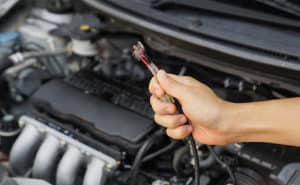
These lawsuits claim that the soy-based covering used by many automakers entices rodents and increases the likelihood of infestation. We’ve got you covered if you’re looking for the best mouse repellent for cars. We offer a reliable rodent defense vehicle protection solution to solve this problem. We have the best rodent repellent for cars to keep the mouse out!
The soy-based coatings are a perfect chew toy for rodents, providing excellent nesting material and a near-endless supply in a warm, hidden spot. If you’re a mouse, it’s the greatest thing ever. But if you’re an owner waking up to a severed fuel line, it’s a little less enjoyable.
Maybe Soy-Based Wiring Is Too Eco-Friendly?
They are chewing wiring covers more often because auto manufacturers have switched from using petroleum-based plastic to protecting the wiring with a vegetable-based type of plastic,the move was part of the car industry’s green movement.
In January 2016, a lawsuit filed against Honda claimed the soy-based wiring was irresistible to rabbits. Later that year, a similar lawsuit was filed against Toyota. In July 2017, Hyundai and Kia sued for using soy wiring.
In each case, the automaker was accused of concealing the problem and/or refusing to fix the issue under warranty.
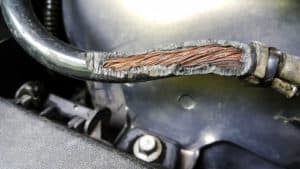
However, regardless of whether wires are covered in soy-based materials, it’s a fact that rodents are drawn to them. RV, Boats, and car owners alike have wrestled with this issue for years.
The damage caused by rodents can result in costly repairs. These repairs typically aren’t covered by your car’s warranty.
If your car has an infestation, you’re at risk of contracting the diseases that the rodents carry. Rodents such as mice, rice rats, and cotton rats can transmit various hantaviruses. These viruses are contained in urine, droppings, and nesting materials and can be fatal to humans.
Rodent infestations can be a major problem for RV and car owners. Squirrels, rats, mice, raccoons, and other creatures often find their way into the cabin or under the hood of automobiles, causing significant damage to the vehicle’s components. This issue has led to lawsuits against car manufacturers. These lawsuits allege that the soy-based covering used by many automakers attracts rodents and increases the likelihood of infestation. If you’re looking for the best mouse repellent for cars, we have a reliable rodent defense vehicle protection solution to help solve this problem. Our product offers the best rodent repellent for cars to keep mice out.
Buy Now
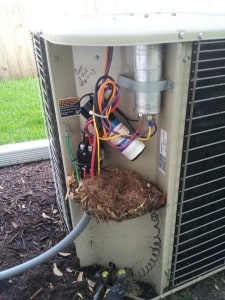
mice-nest-in-air-conditioner-unit
Rodents Nesting In Your HVAC Unit?
An air conditioner is a perfect place for a mouse because the air ducts contain materials they can use to build suitable nests. They will chew on whatever they can find. When they begin to feast on HVAC electrical wiring, your home’s safety is compromised. Chewing through a wire can lead to an electrical fire and a damaged HVAC system. When rodents find their way into your ductwork and make nests or leave droppings behind, tiny fecal spores are swept along by the force of heated and cooled air moving through the ducts. These spores make their way into your home and contaminate the air quality.
So how do you avoid expensive repairs? Prevention is key.
Treat your car with essential oils that emit rodent-repellent smells.
Here at NHOU®, we specialize in solving problems. Here is our strategy — completely different problems with the same solution. Rodent damage and Rust
Over the years, we’ve heard numerous stories from our customers that after having their vehicle coated with NH Oil Undercoating®, the rodent problem miraculously disappeared!
That’s right, just like eliminating annoying squeaks and malfunctioning spare tires that become functional, this is a byproduct of our oil-based rustproofing system.
We’ve taken this one step further by adding essential peppermint oils. Mouse-Out smells nice to humans, but rodents steer clear. This two-pronged approach towards combating rodent damage to your RV, boat or automobile will make a formidable defense and create an unpleasant and inhabitable environment.
Now, as a byproduct of combating rodents, you will have the added benefit of protecting the surface from corrosion for wiring harnesses or body cavities!
We offer safe, effective, non-toxic essential oils and natural pest control products that repel mice and other rodents. NHOU® Will keep the Mouse-Out
NHOU® Keep the Mouse-Out It is available at participating authorized applicators. Also available in aerosol cans, one and 5-gallon buckets.
